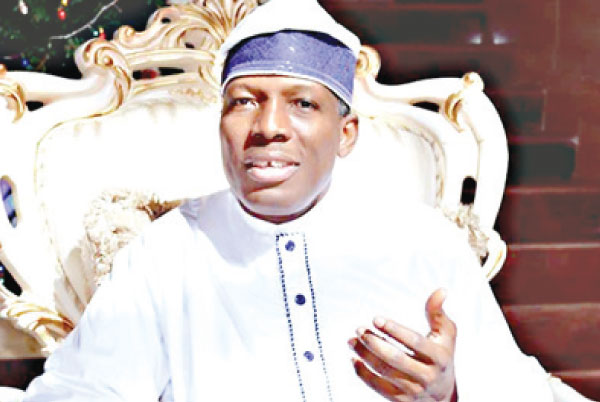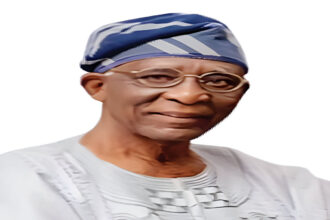As Nigeria economically aches at all fronts, the Founder of the International Cocoa Diplomacy and Oloni of Eti-Oni, Osun State, His Royal Majesty Oba Dokun Thompson, speaks with IMOLEAYO OYEDEYI on how the state governments can effectively deploy the huge allocations they have been getting since the pronounced removal of the petrol subsidy to provide succour to Nigerians amid the rising food inflation.
IN an attempt to absolve the federal government of blame for the prevailing economic woes, a presidential aide, a few days ago, said Nigeria is a very poor country with an exaggerated wealth. But do you think this statement is entirely correct given the vast mineral resources deposited in the country?
Firstly, whoever makes the statement on behalf of the government has a reason for making such a statement. But if I look at the statement more deeply, I can attribute it to two or three reasons. In the first instance, I will ask this question: how rich are we when it comes to crude oil or even gas as a country? The truth is we are not rich through our oil and gas resources, because we have not been able to add value to the resources. We are refining crude oil and we import petrol. So by the time you look at it from this perspective, one can say whoever made the statement is right. And that is the same case with every single resource we have in this country. Whether it is our human resources or non-human resources, we have not been able to add value to them in the proper sense that they can be commercialised to become a source of value and wealth creation opportunities for us all. And for this single reason, we cannot say we are rich when it comes to our resources.
But what do you think has been the major problem? Is it that the resources are not there or they have not been well explored?
Nigeria is a country that I will want to call an extractive economy. In other words, we depend on sales of our resources as unfinished products. Crude oil is a raw material. Cocoa is also a raw material, the same as iron and even solid minerals. They all come as raw materials, including gold. Other people refine them for us. So based on this, they do not generate the kind of value that we expect them to give us, because before you can add value to any kind of resource, you must understand that resource. You must understand its value proposition. You must also be able to invest in what will make it possible for it to add value to you. And when you add value to it, where is your market? How do you provide access to the product? Yes, you have the domestic market but when you are looking at the international market, there are certain standards that you must attain. So those can be prohibitive, but when we have a framework in place and we are determined with the political will and right funding, a very creative and innovative funding that makes it attractive to invest in value-addition of these different resources, then, we can now be saying we are about to create prosperity in Nigeria. But until then, we remain very low in that prosperity index when it comes to our natural and mineral resources.
Having looked closely at our situation, some observers have said most of the products and materials we import are things we can produce as a country, but we have just not had the right political leadership to change the slide…
Often, people say we need the political will to do certain things. But it is not just the political will alone. Imagine, do you make a pronouncement and yet, there is no framework in place to achieve your stated purpose? You have to have a global plan. When you have this plan, you can now start implementing solutions or putting certain structures and infrastructures in place to be able to exploit value in terms of our resources. But mind you, this also requires funding. Meanwhile, don’t also forget that before you can plan, you must have a foundation, which should come from data, your statistics. But that we do not have as a country. So until we can capture the right data and not depend on data given to us by international organizations, we will never be able to exploit those opportunities or the potential that we have.
Removing fuel subsidies and increasing the price of petrol were some of the pieces of advice that international organizations have given the Federal Government. But many Nigerians have said the Federal government should stop taking admonitions from these international bodies, because many a time their suggestions and recommendations for the country, once implemented, do result in more hardship for the Nigerian masses. How true can this be?
Before we can move forward, there are definitely going to be some tough decisions to be made, which will come with tightening our belts. What that translates to is that some sacrifices will be made, which will appear as hardship to the generality of the people. But it will only be for some time. For the past eight years, there have been talks about the excessive money going into the oil subsidy. And only recently, we saw some published figures of how much the states of the federation are now getting per month. This implies that the petrol subsidy removal has brought in more income for the states to be able to provide some sort of succour for the prevailing hardship. But it (subsidy removal) is something that must be done. The present administration has been in office for almost about nine months. And from what I can see, it has put in place a lot of things. But things are the way they are now, because normally at the planning and the beginning of a restructuring process, everything seems to be unbalanced, difficult, or even complex. But that period will give you the space to analyse the situation and balance things in a way that will bring about growth and development.
I know a lot of people are complaining because they can feel that the period is very difficult. But we should also start looking at what the state governments can bring to the table to bring succour, because they now get more income monthly, not from their state Internally Generated Revenue (IGR), but from the federal revenue sharing formulae. So let’s ask ourselves what is happening at the state level. At the Federal level, we can see things being done to have the right framework in place. Yes, it is a difficult period, as we can see how the Central Bank of Nigeria (CBN) has been struggling to balance the issues surrounding the naira depreciation and exchange rates. And when we start harmonising the situations, figures, and the different platforms people are trying to use to resolve the economic issues, we will soon start seeing the benefits of some of the policies.
However, if you look at the state level, you will see that the amount of levies, rates, and taxes being collected by one local government for one purpose or the other is crazy. So everything seems fragmented now. So, there should be a way for us to harmonise all the different tax regimes. We have situations whereby some local government or even state governments have as many as 20 or 30 permits to move goods from one place to another. All these need to change because things cannot be this fragmented and we will expect a forward movement for our economy. Things must be harmonised for us to have a better global picture and move the economy forward.
So what are the key interventions you think the state governments should do as a way of cushioning the effect of the economic hardship on their people?
Don’t forget that most of the states are civil servant states. So the state governments remain the biggest employer of labour across the federation. So with improved revenue allocated to them, the salaries of the civil servants should now be timely and prompt. With that, there needs to also be some sort of planning towards industrialization of maybe agricultural products within each of the states. For instance, Kogi State has Cashew. Their strength should be from Cashew. Ekiti State is known for its education. So their strength should come from education. And the state government can actually redefine Ekiti as the true fountain of knowledge. It should be able to provide academic excellence consistently from the secondary to the tertiary educational level that can rank with what is obtainable anywhere in the world.
Osun State is a place of history and culture. And the state can benefit a lot from things like even Cocoa. What I am saying in essence is that each state of the federation has its strengths and it is high time the state governments capitalized on those strengths and refine them for value-creation. That is missing at the moment. Everybody is just doing the same thing. And that has to change if they truly want to exploit the resources, opportunities, and potential that their states have. I believe that each community and traditional ruler in the states have roles to play in helping the state governments achieve this mission and engender tangible developments all across the country.
More so, the state governments must begin to work more with the rural communities in a bid to transform them into ‘ru-ban’ societies, that is, rural communities that have certain attributes of an urban system. This is because it is in these rural communities that you have farming lands, and farming itself must be seen and treated as a profession. It must also be seen as a thriving business that is not meant for old people. The state governments should make concerted efforts to discourage people from seeing farming as a vocation or retirement plan. This is how they can attract the younger generation to farm with pride. And then, more should also be done to enlighten the youths about agric business, because this is what will make them see farming more as a business and also appreciate the full value chain of any farm product or even a food crop. And then, we need to move away from our traditional market system which encourages a lot of wastage. For instance, if you go into our markets today, you will see that almost 35 per cent of the produce that comes into the market ends up rotting away within the market space itself as waste. So there is a lot of wastage because there is no processing, value-addition, efficient storage system, and good warehousing in place. These are parts of the issues that breed food insecurity in the country. To address it, we need to effectively utilise at least between 90 to 95 per cent of our crop production capacity.
However, how do you think the state governments can allay the fears that many Nigerians have had for farming due to banditry attacks and killings?
There needs to be some level of engagement with the communities. The government needs to restore confidence into the system, especially in certain parts of the state where there are heavy security issues. But how can they do this? I know a lot of people have been calling for the creation of state policing. Even the Federal government and state governments have also reached an agreement on this. But there can also be community policing that will be very close to the people. With this kind of system in place, a lot will be achieved. But beyond that, I believe once adequate jobs are created for the teeming youths and the economy begins to thrive, these will address a great deal of the security issues we are having.








